If you have been following the Science Society's censure of CECA and the subsequent polling of the student body in preparation for a meeting between the Faculty of Science student government and the CECA, then you have likely been waiting for the data dump that has been on its way for some time. That public release of information from our anonymous survey is finally here. Know in advance that this release will be lengthy, so this press release will act to overview of the total collated data. At the end of this article, you can find the total downloadable report on the survey and numerical data collected, with conclusions drawn from student commentary.
Prior to reading this information, make sure you are up-to-date on the censure and the formal response of the CECA to both the censure and the exchange of this data.
Student Survey regarding CECA
Survey Conducted by the Science Society
Results and Summary prepared by: Seneca Velling (Speaker of the Board) & Vaishnavy Gupta (President of the Science Society, Winter 2017)
Overview
Earlier this term, the Science Society censured the Department of Co-operative Education & Career Action. This triggered what became a constructive meeting between the Science Society Board and CECA representatives. In order to adequately convey to CECA representatives the motivation behind the censure and the concerns of students, the society put out an online survey to the student body, requesting general feedback. The purpose of the survey was to bring forward student feedback in preparation for a meeting with SciSoc Board of Directors representatives and CECA staff.
A total 239 co-op student responses were recorded within the week, during the exam period, when the survey was available. Additionally, three (3) regular stream students (one a former co-op student) responded. Of the 242 total responses, five (5) were submitted by graduated students participated in the survey. This report provides an overview of both the survey methodology and the responses/feedback received.
Methodology
Target Audience
The target audience was designated as students currently enrolled in co-op, formerly enrolled in co-op and now in the regular stream, and students who have used CECA services such as résumé help and cover letter preparation.
Distribution
The survey was made available to students via the Science Society (“SciSoc”) webpage, social media, and departmental clubs groups/pages. Principally, students accessed the survey via the SciSoc social media outreach. When students took the survey many (~40) shared the survey with their peers via Facebook's share function.
Survey Instructions
The survey was broken into three main forms of questions: informational assessment, services assessment, and free response. The informational assessment questions guided students to choose from a set of options for what Faculty (or program if in Science Faculty) they were part of, what year in University they were (eg. 1A or 3B), and how many co-op terms they had completed. The services assessment questions instructed students to rank in order of preference various aspects of the CECA, their advisors, and their experience with either Jobmine and/or WaterlooWorks as applicable. These questions comprised the majority of the survey, and were structured to minimize incidental bias in responses (viz. the order of survey questions attempted to reduce biased responses). The services assessment questions were ranked from 1 being Poor, to 5 being Excellent, with 3 as Satisfactory in between. The last question on the survey was a free response question to allow students to expand on issues they felt were outstanding, or to address concerns not highlighted above in the services questions adequately.
Students were asked to complete the following informational assessment questions:
Q1. What is your current year of study?
Q2. Please select your academic plan, as listed in the undergraduate calendar.
Q3. How many co-op terms have you completed?
Students were asked to complete the following services questions (scaled):
Q4. How well do you feel student issues with co-op are addressed by CECA? (poor being 1, satisfactory being 3, and excellent being 5
Q5. Please rate the professionalism of your CECA co-op advisor. (poor being 1, satisfactory being 3, and excellent being 5).
Q6. Please rate the helpfulness of your CECA co-op advisor. (poor being 1, satisfactory being 3, and excellent being 5).
Q7. Please rate your experience with JobMine or WaterlooWorks as applicable. (poor being 1, satisfactory being 3, and excellent being 5).
Q8. Please rate your overall experience with CECA (poor being 1, satisfactory being 3, and excellent being 5).
Students were asked for comments through the following free response question(s):
Q9. Please share any feedback regarding CECA, and your experience with co-op, that you wish to be voiced to the Science Society Board of Directors and to CECA representatives.
Findings
Informational Assessment
Year of study (Graph 1):
- Mean: 2.9110 year
-
StDev: ±0.925 years
-
Median: 3 year
-
Mode: 3 year
Academic Plan or Faculty (Graph 2):
-
Mathematics Faculty ~8.7%
-
Science Faculty ~44.8%
-
AHS Faculty ~0.82%
-
Environment Faculty ~17.8%
-
Engineering Faculty ~19.9%
-
Arts Faculty ~7.9%
Number of Completed Co-op Terms (Graph 3):
-
Mean: 2.177 terms
-
StDev: ±1.370 term
-
Median: 2 terms
-
Mode: 2 terms
Services Assessment
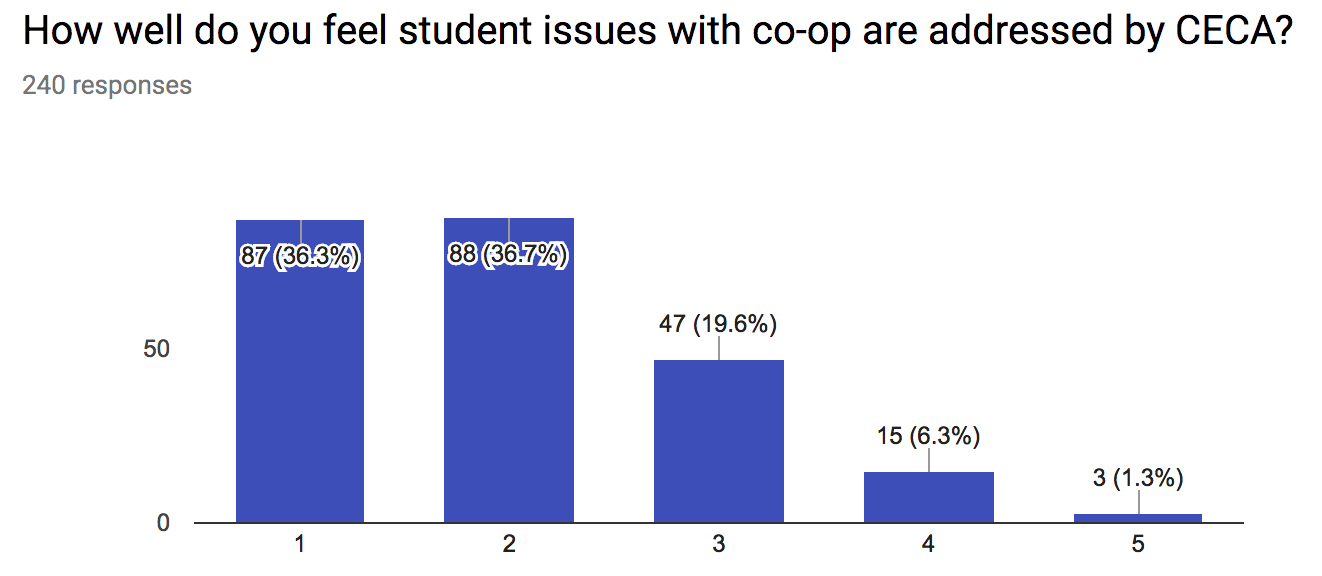
Graph 4 – CECA addresses to student concerns. 240/242 responses. 1=poor, 3=satisfactory, 5=excellent Statistical breakdown: Mean 2, StDev ±0.9614 term, Median 2, Mode 2
Graph 4 Summary: Respondents believe overwhelmingly that student issues are not well addressed by the CECA, with 73% of responses below ‘satisfactory’ or as ‘poor’.
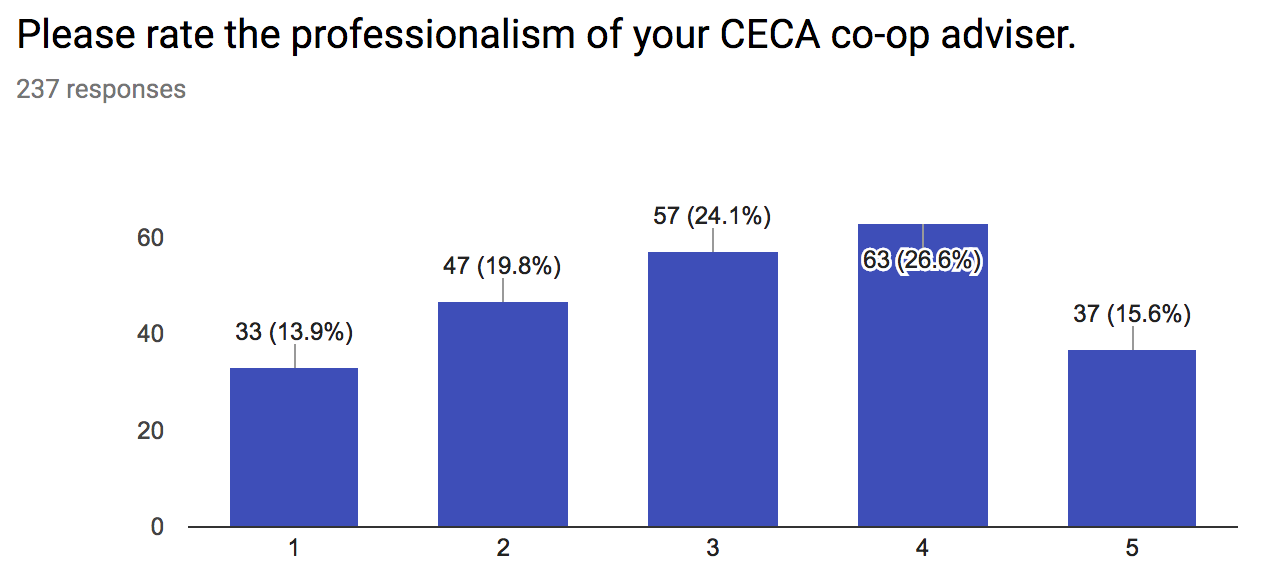
Graph 5 – Professionalism of CECA Co-op Advisors. 237/242 responses. 1=poor, 3=satisfactory, 5=excellent Statistical breakdown: Mean 3.1102, StDev ±1.2768 term, Median 3, Mode 4
Graph 5 Summary: Respondents tend to believe that their CECA Advisors are professional, with 66.3% of responses falling between 'satisfactory' and 'excellent'.
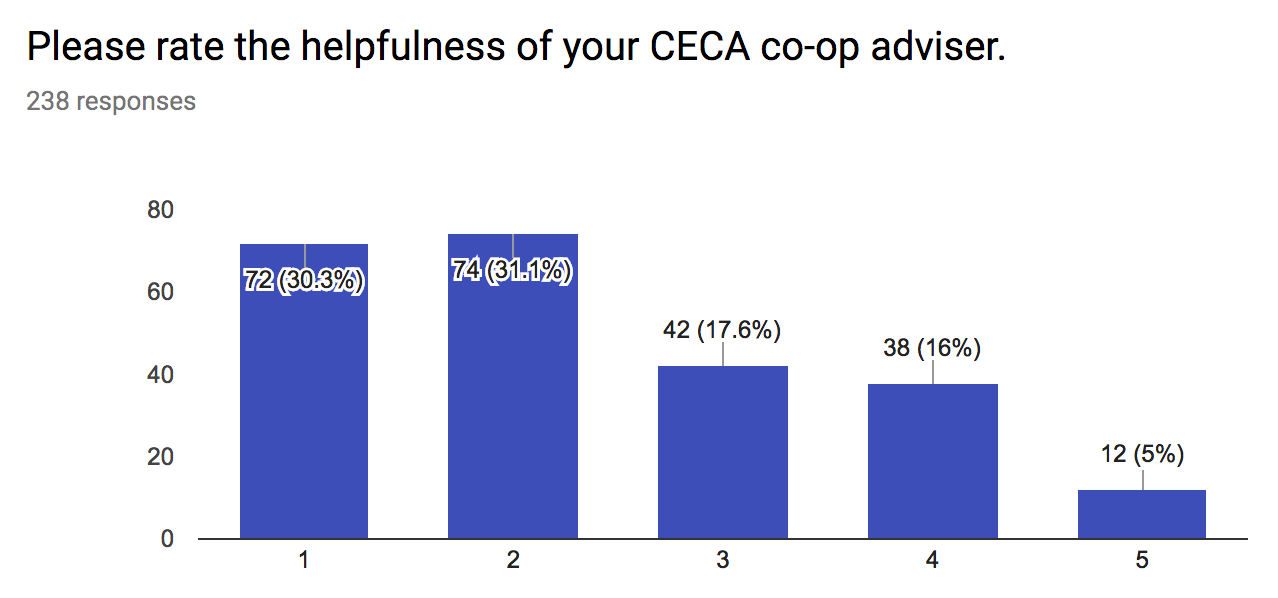
Graph 6 – Helpfulness of CECA Co-op Advisors. 238/242 responses. 1=poor, 3=satisfactory, 5=excellent Statistical breakdown: Mean 2.3502, StDev ±1.2072 term, Median 2, Mode 2
Graph 6 Summary: Respondents tend to believe that their CECA Advisors are not helpful, with 61.4% of responses falling below ‘satisfactory’ or as ‘poor’.
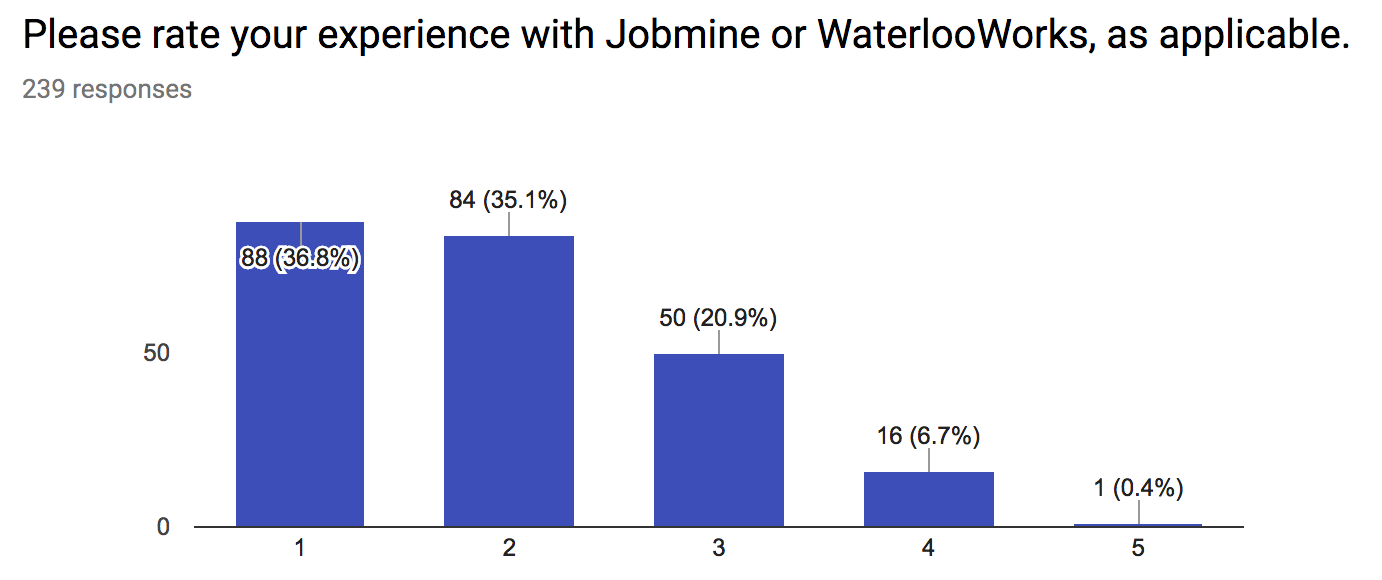
Graph 7 – Experience with Jobmine or Waterloo Works. 239/242 responses. 1=poor, 3=satisfactory, 5=excellent Statistical breakdown: Mean 1.9916, StDev ±0.9413 term, Median 2, Mode 1
Graph 7 Summary: Respondents overwhelmingly have had a negative experience with WaterlooWorks or Jobmine, with 71.9% of responses falling below 'satisfactory' or as 'poor’.
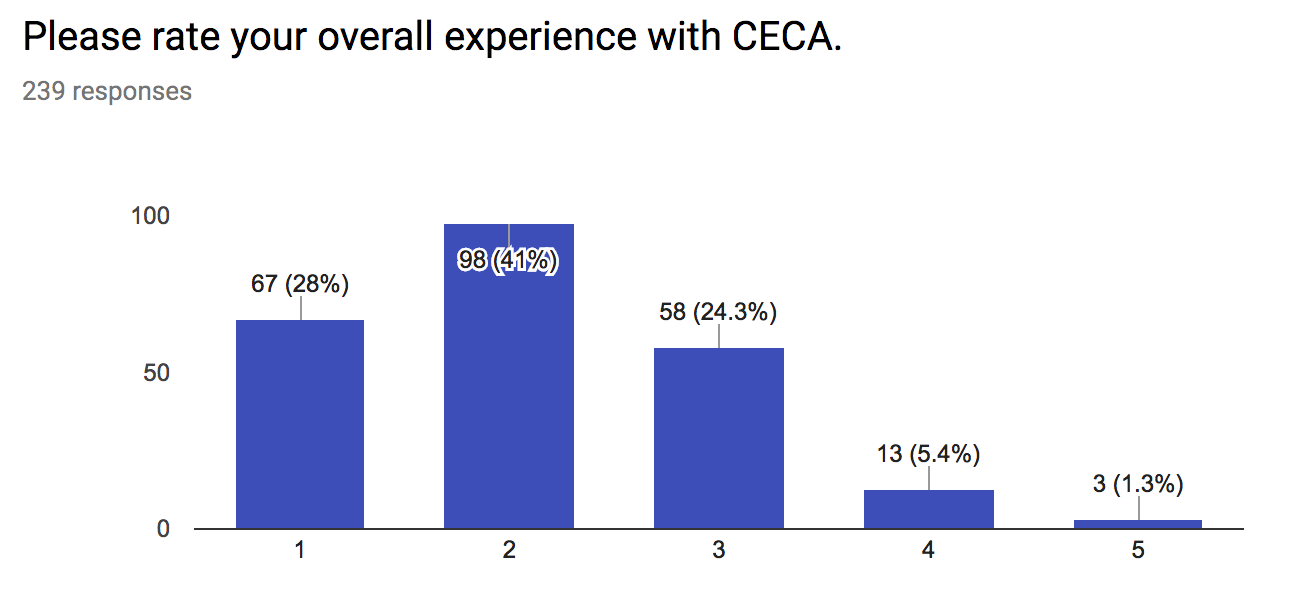
Graph 8 – Experience with CECA overall. 239/242 responses. 1=poor, 3=satisfactory, 5=excellent Statistical breakdown: Mean 2.1134, StDev ±0.9185 term, Median 2, Mode 2
Graph 8 Summary: Respondents definitively had a negative experience with CECA, with 69% of responses falling below âsatisfactory’ or as âpoor’, and 24.3% of responses as 'satisfactory'.
Themes
-
CECA Advisors ranked high in professionalism, with 66.3% of responses falling between ‘satisfactory’ and ‘excellent’. However, CECA Advisors also ranked low in helpfulness, with 61.4% of responses ranking below ‘satisfactory’ or as ‘poor’.
-
CECA ranked low in student satisfaction with the organization's ability to address student issues, with 73% of responses below ‘satisfactory’ or as ‘poor’. Similarly, students surveyed indicated a negative experience with the CECA overall, with 69% of responses below ‘satisfactory’ or as ‘poor’.
-
Malcontent with WaterlooWorks and/or Jobmine was high, with 71.9% of responses falling below 'satisfactory' or as ‘poor’. Reiterated student commentary in the free response question regarding WaterlooWorks and/or Jobmine highlighted that Jobmine was perceived as functional but lacking in the interface, whereas WaterlooWorks is perceived as clunky and not functional, but with a flashy interface. This would indicate students prefer functionality to user interface.
Summary of Constructive Commentary
NOTE: raw respondent commentary will not be released to students. If you are from a student or faculty governing board or the CECA you may request this data under nondisclosure agreement.
-
Open ended responses of students which were characteristic of problems with WaterlooWorks tended to address the failure to support students through the role out of the new system this year and the lack of available documentation in this system to become an asset to the student body. Responses noted that WaterlooWorks feels as though it was not tested beyond a cursory level for usability and basic workflow. Comments cited the sheer number of small defects and problems that students had found as indicative of the poor functionality of the Software.
-
Characteristic responses regarding malcontent with the CECA tended to involve a perceived favouritism towards employers. Some respondents felt that this perceived bias toward employers came at the expense of students.
-
Some responding students felt confident that their co-op advisors really do care about them as students, and that these advisors were working diligently to ensure student success in the co-operative education system.
-
Many responding students reiterated the lack of clarity in fee structure and wastefulness of CECA (citing WaterlooWorks roll out costing ~7 million dollars over multiple years from co-op fees and from the Provost's office). Responding students derided CECA not making clear how their money is spent and why they were not aware of what services it is that CECA provides students (other than WaterlooWorks).
-
Some responding students noted that clarity in fees could be reconciled if CECA responsibly provided co-op students a breakdown of exactly what it is their fees were spent on and better promoting whatever services they offer.
-
Regarding CECA services, responding students felt it was unacceptable that they could only book up to three of each type of appointment during your time in UWaterloo. That in five years of co-op enrollment for most students, the limited appointments did not provide sufficient support and were a large reason students were no longer going to CECA for support on their résumés and cover letters, and rather approaching the writing center.
-
Many students supported a requirement for wages to be listed in the job description so students can more easily determine if a job is right for them.
-
Responding students asserted that they feel as though they cannot criticize or complain about CECA (via internal methods) because CECA does not allow anonymous reporting of internal concerns (viz. CECA requires giving up one's identity). Responding students felt this could lead to problems if individual employees or their peers at CECA became aware of complaints.
-
Many first year respondents implored Waterloo to publicized job hiring rates per term (eg. rates for 1A vs rates for 3B of a particular program) and enrollment and drop-out rate per program in co-op. Responses noted that this would have influenced the decisions to attend Waterloo or might have changed their program of choice.
Conclusions
Overall, the findings highlight some student concerns with CECA. 242 respondents (including graduated students and students from a distribution of faculties at Waterloo) participated in this survey, in the height of final exam season. This amounts to fraction of the total co-op enrollment and therefore may not be generalizable to the student population at large.
As noted above, the statistical distribution of participants was in majority Science students (~44.8%), with Engineering (~19.9%) and Environment (~17.8%) students following close behind in participation. General population data presented above was the culmination of responses from all the Faculties, but statistical distribution was weighted to Science, Engineering, and Environment due to greater response rate from students in these faculties. The average respondent had completed just over 2 co-op terms with a standard deviation of ~1 co-op term. Both the median and mode of participation data indicates that most all participating students had at least two co-op terms completed, and that they were predominantly in their third year of study (~38.4%). The next largest cohort of students was in second year (~31.8%), followed by fourth year (~19.4%).
While the extent of the survey was large, particularly considering the survey was administered during exam period and student apathy at Waterloo is high (for evidence of this please explore voter turnout reports from the Federation of Students), the results may not be indicative of the true satisfaction or dissatisfaction of students enrolled in the co-operative education program. Based on the target audience criterion, over +17,500 students were eligible to respond, but only 242 students did so. So while numerous points respondents brought forth are valid, conclusions drawn from the numerical data should be conditioned due to the limited sample size of this survey. That being said, with the data collected the Science Society can definitively say that many of the survey respondents felt they had a negative interaction with CECA in some capacity, and that CECA has much work to do in order to meet student satisfaction levels in service. The main areas identified of concern were:
-
CECA Advisor helpfulness;
-
The lack of clarity in fees and organizational expenditure;
-
The lack of routinely updated and available hiring and drop-out rate data per program;
-
The need for student evaluation of employers;
-
The need for anonymous internal reporting methods for complaints regarding CECA or CECA staff;
-
The lack of functionality and documentation provided for WaterlooWorks.
There were also many negative comments related to usefulness of WatPD and perceived waste of student money with this program. These comments are being forwarded to the WatPD department, which is a separate unit on campus to CECA. The Science Society is working with the CECA and will begin dialogue with WatPD regarding clarifying for students the nature of aspects of the co-op program at Waterloo, as both areas directly impact the co-op student experience.
It is noted that the survey was optional (not mandatory), so responses may have been limited to students who felt a need to provide CECA with feedback. The Science Society has encouraged CECA to implement regular (and perhaps mandatory) survey mechanisms for co-op students.
The CECA has responded formally regarding received survey data and next steps to address concerns raised. For more information about the CECA resolution visit the Science Society's website or Facebook page.
Click to download view the report.

Raw Data Request
If you are from a student or faculty governing board or the CECA you may request the raw data under nondisclosure agreement. For access to raw data please contact: Seneca Velling & Vaishnavy Gupta. For all other inquiries, please do not hesitate to reach out to the MNS Society or Science Society.